Gia Blu-ray Movie
HomeGia Blu-ray Movie 
HBO | 1998 | 125 min | Unrated | Nov 08, 2011
Movie rating
6.8 | / 10 |
Blu-ray rating
| Users | 3.7 | |
| Reviewer | 3.5 | |
| Overall | 3.5 |
Overview
Gia (1998)
Fact-based story of top fashion model Gia Marie Carangi follows her life from a rebel working in her father's diner at age 17 to her death in 1986 at age 26 from AIDS, one of the first women in the U.S. whose death was attributed to the disease. In between, she followed a downward spiral of drug abuse and failed relationships.
Starring: Angelina Jolie, Elizabeth Mitchell, Faye Dunaway, Mercedes Ruehl, Mila KunisDirector: Michael Cristofer
| Romance | Uncertain |
| Erotic | Uncertain |
| Biography | Uncertain |
| Drama | Uncertain |
Specifications
Video
Video codec: MPEG-4 AVC
Video resolution: 1080p
Aspect ratio: 1.78:1
Original aspect ratio: 1.78:1, 1.33:1
Audio
English: DTS-HD Master Audio 5.1 (48kHz, 24-bit)
Subtitles
English, French, Spanish
Discs
25GB Blu-ray Disc
Single disc (1 BD)
Playback
Region free
Review
Rating summary
| Movie | 2.5 | |
| Video | 4.5 | |
| Audio | 4.0 | |
| Extras | 0.0 | |
| Overall | 3.5 |
Gia Blu-ray Movie Review
Punishing the Bad Girl
Reviewed by Michael Reuben November 6, 2011Gia, the 1998 made-for-HBO biography of doomed model Gia Marie Carangi, is usually remembered for its breakthrough performance by Angelina Jolie in the title role. Winning a Screen Actors Guild Award and a Golden Globe for her portrayal of a volatile personality who blazed through the fashion world like a shooting star, and burned out just as quickly, Jolie leapt off the screen (and still does). She hadn't yet acquired the baggage of multiple celebrity marriages, high-profile adoptions and a life with which tabloids and celebrity gossip rags seem endlessly fascinated. She still had the freedom to give a performance that surprised the audience, which was exactly what the wildly unpredictable Gia had done before drug addiction, erratic behavior and AIDS took their toll. Today, Jolie is a more familiar presence, and it's possible to look past the accomplishment of the performance to the essential emptiness of the film surrounding it. As brilliant as Jolie is, one of the essential qualities of Gia Carangi -- one that's stressed in the film -- is that no one really knew her. Everyone saw her differently, and the accounts are wildly at odds. This is hardly surprising, given that an individual who doesn't live past age 26 has barely finished exploring who she is and deciding what she wants to be, a task made all the more difficult in an industry (fashion) that trades in surfaces, superficialities and "lies" (as one angry member of Gia's rehab group puts it). Late in the film, when Gia knows she's dying, she gives all her journals and stories to her sometime lover, Linda, and tells her to read them. "Maybe you can make some sense out of it", she says. "I never could." A well-realized bio-pic can make the viewer experience what it was like to be the person who is the film's subject. The ways to achieve this are limited only by filmmakers' imaginations, but they can be as varied as Olivier Dahan's fracturing of chronology and erasure of the boundary between subjective and objective points of view in La Vie en Rose (La môme), and Tom Hooper's viewing of English politics and history through the prism of George VI's speech impediment in The King's Speech. But Gia isn't really a bio-pic. The woman at the center of the story remains a cipher. When the camera and an unseen interviewer listen to the recollections of key people in her life, especially Gia's mother (played by Mercedes Ruehl in a remarkable portrait of guilt and denial), it's not Gia these people are illuminating; it's themselves. What, then, is Gia really about? A clue comes from the choice of screenwriters. One of them, Jay McInerney, became rich and famous for his depiction in Bright Lights, Big City of urban Eighties culture as a cocaine-fueled spiritual wasteland of empty pleasures. The other, Michael Cristofer, who also directed, is a playwright and actor whose most successful work, The Shadow Box, was about three people dying in a hospice. Together McInerney and Cristofer crafted a traditional morality tale in which self-expression and indulgence in pleasure (especially of the lesbian variety) lead to an initial flush of success -- because the devil always gives you that first rush to tempt you further -- but then suck you down into a quagmire of loss, degradation, chaos and eventual physical decay and death. Especially in the last thirty minutes of the film, where Cristofer seems to delight in dwelling on every detail of how first drugs, then AIDS, destroyed Gia's looks and the animal vitality that made her such a novelty, the film plays like a medieval Christian canvas by Hieronymus Bosch, where all manner of lusts and perversion may be depicted -- as long as there are demons nearby preparing to flay the flesh off the sinners' backs.
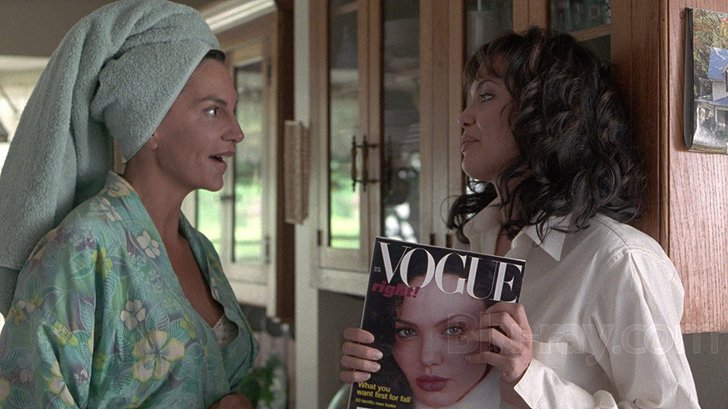
Note: The version of the film on Blu-ray is unrated and runs about five minutes longer than the version originally shown on HBO. Gia opens with a text screen indicating that the story is being told in Gia's own words and those of people who knew her. The statement is somewhat misleading, since the closing credits indicate that elements of the story have been fictionalized for dramatic purposes. Nevertheless, the film begins with a series of mock interviews, shot in a different style from the main feature, in which various figures from Gia's life reflect on who she was. Portions of these interviews will recur through the film, especially with Gia's mother, Kathleen Karangi (Ruehl). We meet Gia as a little girl in Sixties Philadelphia, the daughter of Kathleen and Joe (Louis Giambalvo), a restaurant owner. The young Gia is played by an equally young Mila Kunis. Having already borne two sons, Kathleen was delighted to have a daughter, on whom she doted, but her marriage to Joe was troubled, and she left when Gia was eleven. At least according to the film, Gia never recovered from Kathleen's departure. Fear of abandonment became one of the great terrors that drove her. At seventeen, Gia is working in her father's restaurant, all spiky hair and attitude, when she impulsively runs off to New York City with a gay male friend, T.J. (Eric Michael Cole), who, for a brief time, serves as her roommate, confidante and companion as she explores new territory. She quickly finds her way to the famed modeling agency run by Wilhelmina Cooper (a very fine Faye Dunaway), who immediately spots the potential in this wild child and becomes her surrogate mother (whether for sentiment or profit is impossible to say). Cooper's sudden death in 1980 from lung cancer will ultimately send Gia into a downward spiral from which she never recovers. During a photo shoot with a photographer called "Chris von Wagenheim" in the film (Alexander Enberg), the photographer invites the models to stay for a nude shoot, and Gia is the only one who accepts, on one condition: that her make-up woman, Linda (Elizabeth Mitchell), remain as well. Sensing the attraction, Chris includes Linda in the photographs shot against a chain link fence, and a relationship is born, even though Linda has a boyfriend. This is the closest Gia will ever come to true love, but its course never runs smooth. The entire future of Linda's and Gia's relationship is foretold the next morning in the hallway outside Gia's apartment, when Linda tries to leave and Gia runs out into the hallway after her, wearing nothing. As Gia stands there begging Linda to stay, there's something remarkable about her ability to use public nudity both for its abject exposure and, simultaneously, as a threat. (It's difficult to imagine an actress other than Jolie who could have pulled off this scene and many others in the film.) Except for montages of magazine covers and the occasional fashion show, Gia doesn't really show us what made Gia Carangi such an overnight success, and even those briskly edited sequences can't convey much, because context is everything. Far more is conveyed by an Anna Wintour-like Vogue editor (Tricia O'Neil) haranguing her assistants as she dismisses slide after slide of faces for the next cover, because she's seen the model (or the type) before. When she gets to Gia, she pauses, because the face is unlike anything she's seen up till then. Even at the height of her fame and earning power, Gia is unhappy, because it's a standard theme in show business biographies that wealth, fame and applause cannot fill the hole left by emotional abandonment. ("People are always leaving me", Gia says.) During a break in one photo shoot, the photographer, Francesco (Edmund Genest), advises Gia to focus on work and let life unfold in its own time. But patience isn't in Gia's repertoire; she does everything at top speed, whether it's pursuing Linda (and breaking up her straight relationship in the process) or moving from cocaine to snorting heroin to mainlining. Nowhere is the filmmakers' moralistic reproach of both Gia and the audience more evident than in their ghoulish depiction of how AIDS ravaged her. These were the early days of the disease, when it had just been named and medical science could barely keep pace with the opportunistic infections. Having already dwelt on track marks and infected injection sites, the degradation of junkie hangouts, beatings and sexual exploitation by dealers and the horrors of cold turkey withdrawal, director Cristofer now takes his leading lady (and us) through the minutia of skin lesions, hair loss and, ultimately, the complete disintegration of Gia's body. It's as if, having been voyeuristic participants in Gia's animal enjoyment of the flesh, we must now do penance by witnessing its mortification. As a coda, the writers slap on an excerpt from Gia's journal attesting that "it was worth it", and director Cristofer (who comes from the theater) allows Angelina Jolie to take a curtain call by rising from Gia's death bed attired in and surrounded by white, like a risen angel. And why not? We've all been purified by suffering.
Gia Blu-ray Movie, Video Quality 
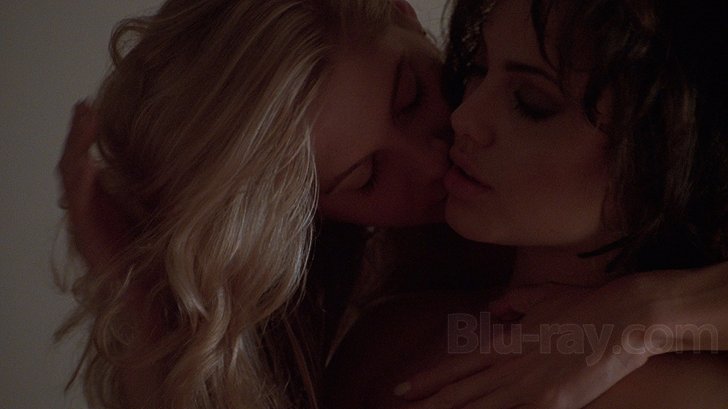
Gia was shot by Rodrigo Garcia in one of his last outings as a cinematographer before he moved permanently into the director's chair. Except for the stylized interview inserts and historical montage sequences of Gia's career, the film's look is clean, simple and not intended to call attention to itself. HBO's 1080p, AVC-encoded Blu-ray looks very nice indeed, with plenty of fine detail, good black levels, vivid colors (especially important for some of the more outré outfits) and finely visible, natural grain patterns. With no extras and only one soundtrack, the film fits comfortably on a BD-25 without compression issues or artifacts, and I saw no indication that detail had been stripped or filtered to simplify the compressionist's job. Since Gia was only ever shown on HBO, there is no theatrical experience against which to compare it, but the presentation on this Blu-ray is as good as any theatrical presentation one might wish. Note: The framing on the Blu-ray is 1.78:1, whereas the framing on the previous DVD and HBO's initial broadcast was 1.33:1. Comparison between DVD and Blu-ray indicates that the latter contains significantly more image information at the left and right, and slightly less at the top and bottom. It appears that the film is one of those troublesome hybrids that was composed and "protected" for both aspect ratios, either of which could be considered "correct". Having looked at both, I would say that 1.78:1 seems better balanced and more effectively situates the characters in their scenes. On all other points, the Blu-ray's visual superiority is beyond question.
Gia Blu-ray Movie, Audio Quality 
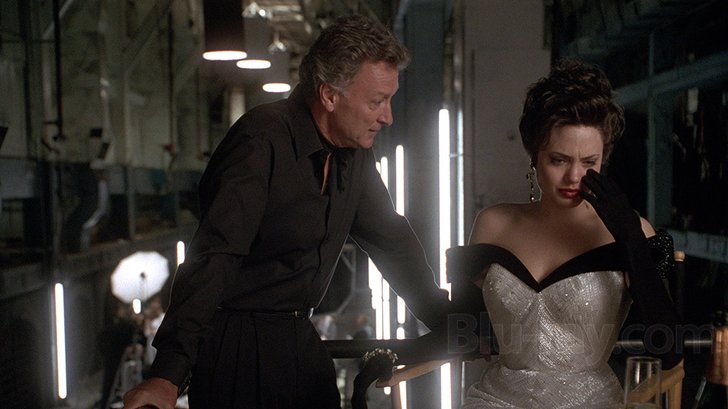
The credits indicate that Gia was originally shown in Dolby Surround, which is consistent with HBO's broadcast format in January 1998, when the film first aired. The soundtrack was subsequently remixed for 5.1, and that mix is presented on Blu-ray in DTS-HD MA. Dialogue is clear and remains firmly centered. Only a few effects can be said to spread emphatically into the surrounds; the popping of flashbulbs is a notable example. As is often the case with two-channel surround tracks remixed for 5.1, the chief beneficiary is the score, which in this case happens to be well worth the improvement. The coolly understated score by jazz great Terence Blanchard provides the ideal counterpoint to the film's lurid subject matter (and the word "lurid" applies equally to Gia's tempestuous life and director Cristofer's sotto voce moralizing). The Blu-ray's track places Blanchard's score all around the room so that it seems to suspend itself above the sound and fury, which is where it belongs. The occasional period-specific pop tunes (e.g., "Brass in Pocket" by The Pretenders; "Dancing with Myself" by Billy Idol) have been mixed toward the front, so that these remain separate and apart from the score.
Gia Blu-ray Movie, Special Features and Extras 
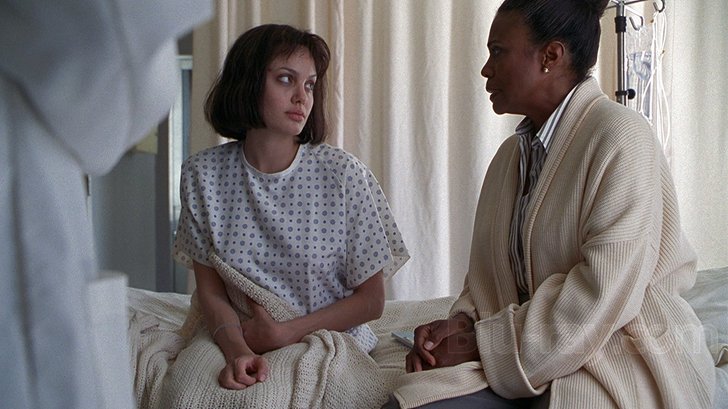
None.
Gia Blu-ray Movie, Overall Score and Recommendation 
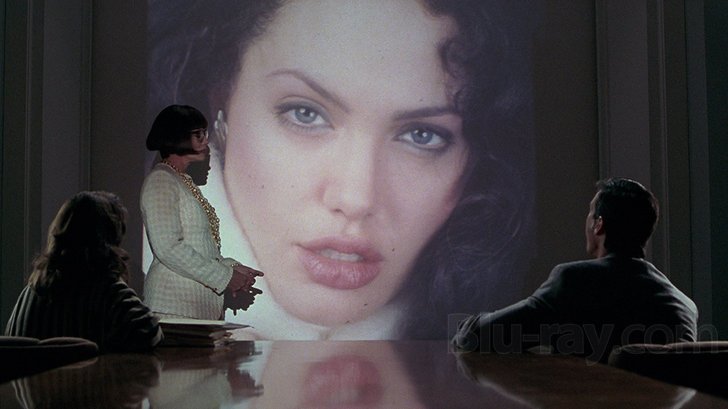
Jolie's performance as Gia remains worth seeing as a one-of-a-kind (re)creation of a personality who remains a mystery. But the film itself is a preachy, finger-wagging tract that basically tells girls to stay home, be good and be normal -- or else! My rating for the film reflects this mixture of good and bad. As for the Blu-ray, it's technically superior and, on that score, recommended.
Similar titles
Similar titles you might also like

The Boost
1988

Young Man with a Horn
Young Man of Music / Warner Archive Collection
1950

Harlow
1965

The House of the Spirits
1993

Daydream Nation
2010

Yankee Doodle Dandy
Warner Archive Collection
1942

Indecent Proposal 4K
1993

Finding Neverland
2004

Mao's Last Dancer
2009

Closer
2004

Bel Ami
2012

Antwone Fisher
2002

Désirée
Limited Edition to 3000 - SOLD OUT
1954

Torch Song Trilogy
1988

Boom Town
1940

Behind the Candelabra
2013

The Private Lives of Elizabeth and Essex
Warner Archive Collection
1939

Kill Your Darlings
2013

Big Eden
2000

Sadie McKee
Warner Archive Collection
1934